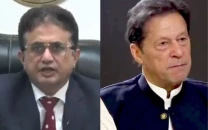Lawyer Mahnoor leads fight against 'period tax'
Says menstrual products are essentials, not luxuries

"Since my childhood, I observed that females face serious challenges in society, especially regarding their right to health," says Mahnoor Omer, a young lawyer and activist who has taken a bold legal step against what she calls institutional discrimination toward women in Pakistan.
Speaking on Express News Morning Show, she said, "If we have licences to practise law, then why not use them to challenge the injustices women face every day?"
Her remarks come as the Lahore High Court (LHC) admits a landmark petition filed by her, challenging heavy taxation on sanitary pads — a move that has sparked national debate over gender equality and women's health rights.
The petition argues that menstrual hygiene products, which are essential for women's health, are wrongly categorised as luxury goods and subjected to excessive taxation.
Omer said she had been deeply aware of the hardships faced by women since childhood. "Periods are a basic biological function that we don't even teach our daughters about," she said.
"A young girl often feels confused when her periods start, and even mothers hesitate to talk about it. If we can talk about family planning and population control, then menstrual health should also be discussed openly."
Despite facing harsh criticism and ridicule on social media, Omer remains determined. "There is an emptiness in our society when it comes to women's issues. But I am hopeful that after winning this case, women's health will improve, diseases will decrease, and our society's mindset will begin to change."
The petition highlights that sanitary pads currently face up to a 40% tax burden, including an 18% sales tax on locally manufactured products and about 25% customs duties on imported materials. Omer contends that these taxes are discriminatory and violate women's constitutional rights to equality, dignity, and social justice under Articles 3, 14, 25, and 37 of the Constitution.
"When I was in school, I used to hide my pad up my sleeve like I was smuggling drugs," she recalled. "Even today, many women think pads are a waste of money — that's how normalised the neglect of women's health has become."
Her case has reignited the national conversation on gender-based inequality in taxation and access to hygiene products. Women from all walks of life have expressed their support.
"Pads are not affordable for many of us," said Hira Amjad, a women's rights activist from Lahore. "Even working women hand their salaries to their families, and men usually decide what to buy. Menstrual hygiene rarely makes the list when prices are so high."
A factory worker from Sheikhupura said the rising cost of pads forces her to make heartbreaking choices. "When my period starts, I must choose between buying pads or milk for my children. Sometimes I stay home from work because I can't afford both."
Similarly, a university student in Lahore shared that she often borrows pads from friends because her monthly allowance doesn't cover them. Doctors warn that such financial hurdles push many women to use unsafe alternatives like cloth or paper, causing infections and other health problems.
"If sanitary products remain expensive, girls will continue missing classes every month," said a gynaecologist from Lahore. "This is not only about money, it's about health, dignity, and the right to education."
According to a 2024 Unicef and WaterAid study, only around 12% of women in Pakistan use commercially manufactured sanitary pads, while the rest rely on unhygienic substitutes. The petitioners argue that the tax worsens "period poverty", further marginalising women and girls.
The LHC has issued notices to the federal government, the Federal Board of Revenue (FBR), and other concerned departments to submit replies. The next hearing is expected in early November. The bench has raised questions about jurisdiction, since some respondents are based in Islamabad, but granted the petitioner's counsel time to respond.
Civil society organisations and health experts have called the tax a "gender bias in disguise", arguing that it reflects deep-rooted insensitivity in fiscal policy. A single pack of 10 pads now costs around Rs450 — a steep price given that the average monthly income in Pakistan is about Rs33,000 — making menstrual products nearly as costly as basic household necessities.
Activists note that many countries, including India and the United Kingdom, have already abolished taxes on menstrual products, recognising them as basic health necessities. They urge the federal government to do the same to align with global equality and health standards.
If the court declares the tax unconstitutional, it could set a historic precedent, forcing the government to recognise sanitary pads as essential goods and eliminate all taxes on them.
For now, women across Pakistan continue to speak out, calling the 40% tax on sanitary pads not just unfair but inhumane — a burden that strips them of dignity, health, and equality.




















COMMENTS
Comments are moderated and generally will be posted if they are on-topic and not abusive.
For more information, please see our Comments FAQ